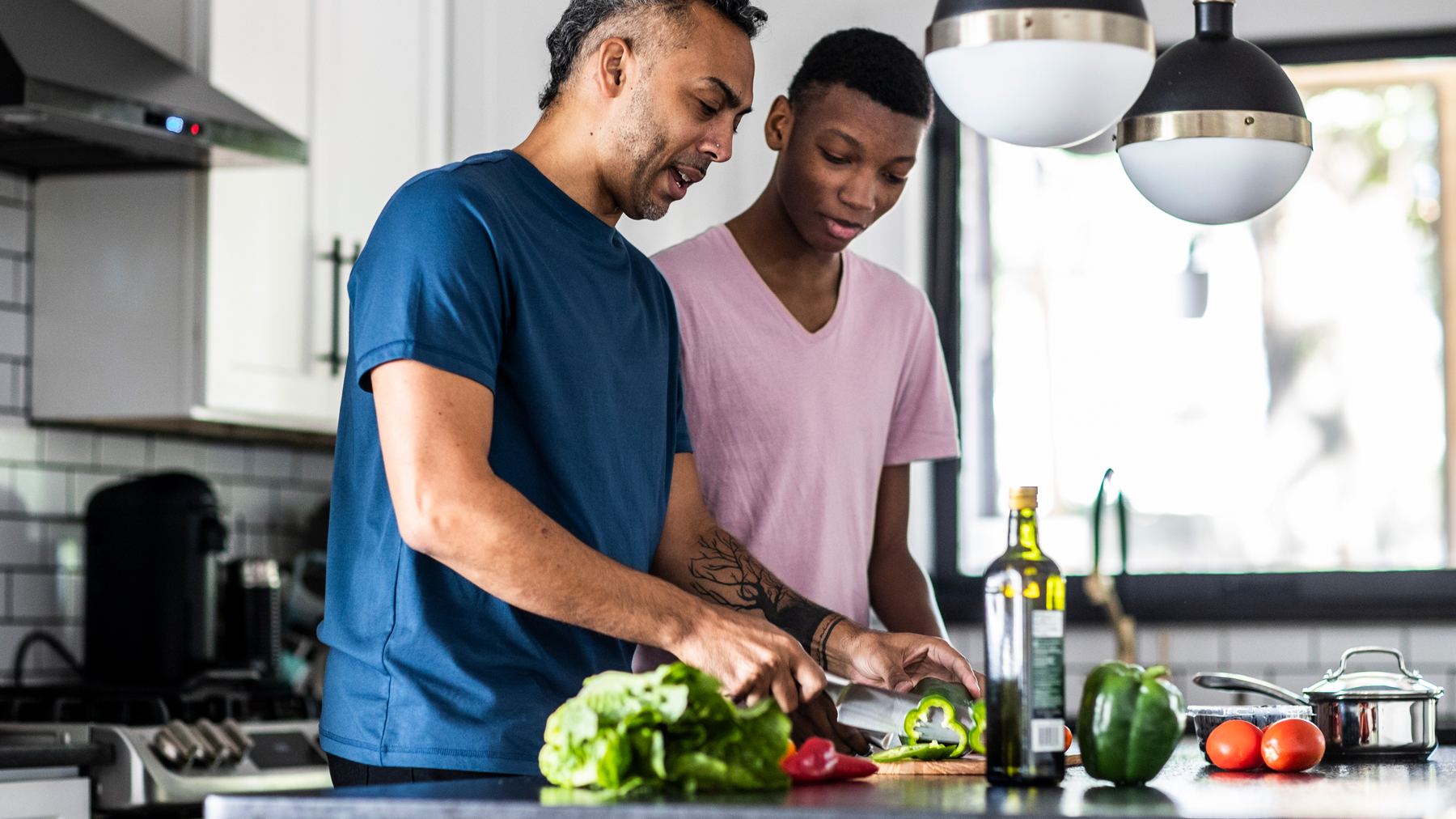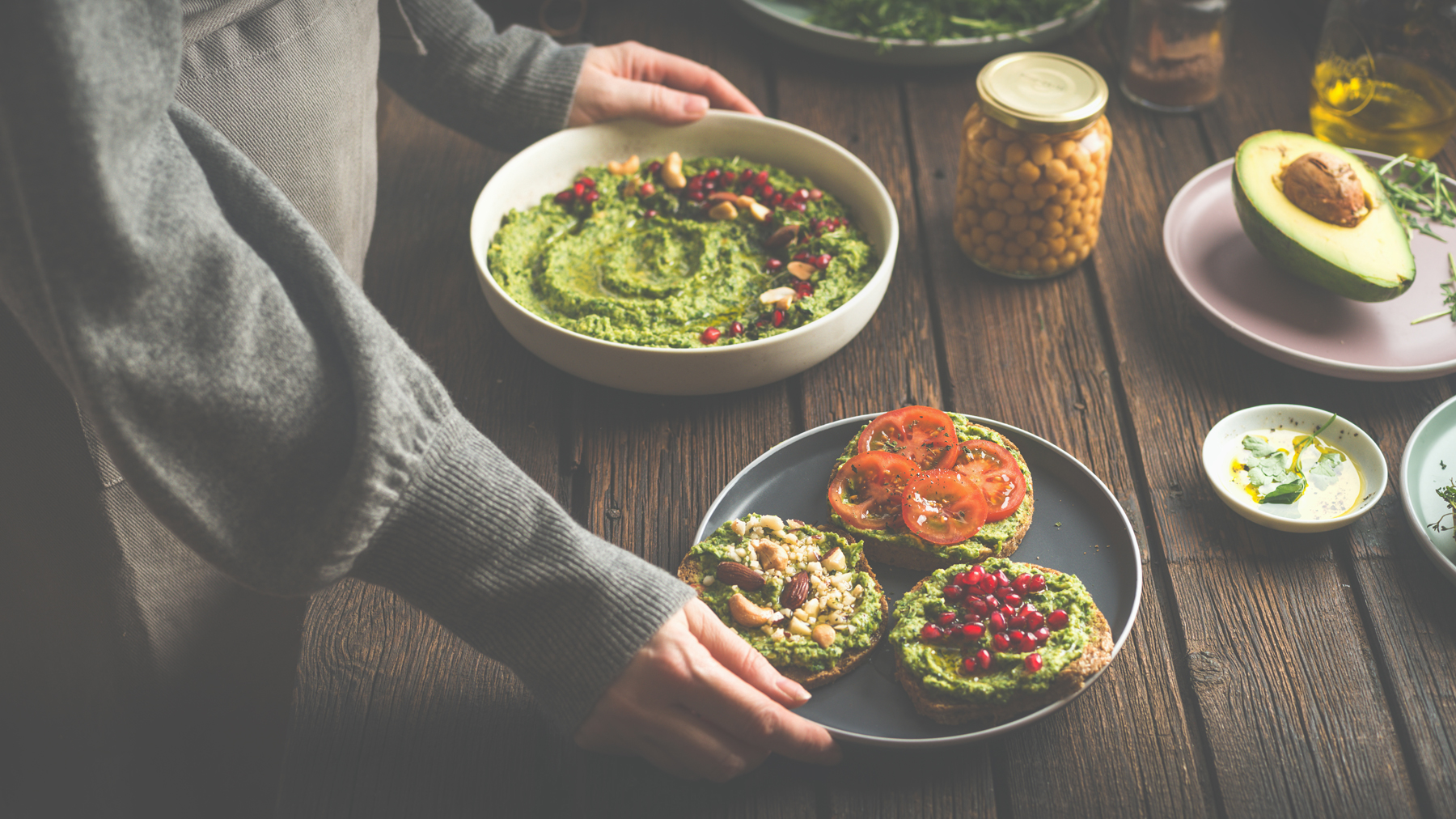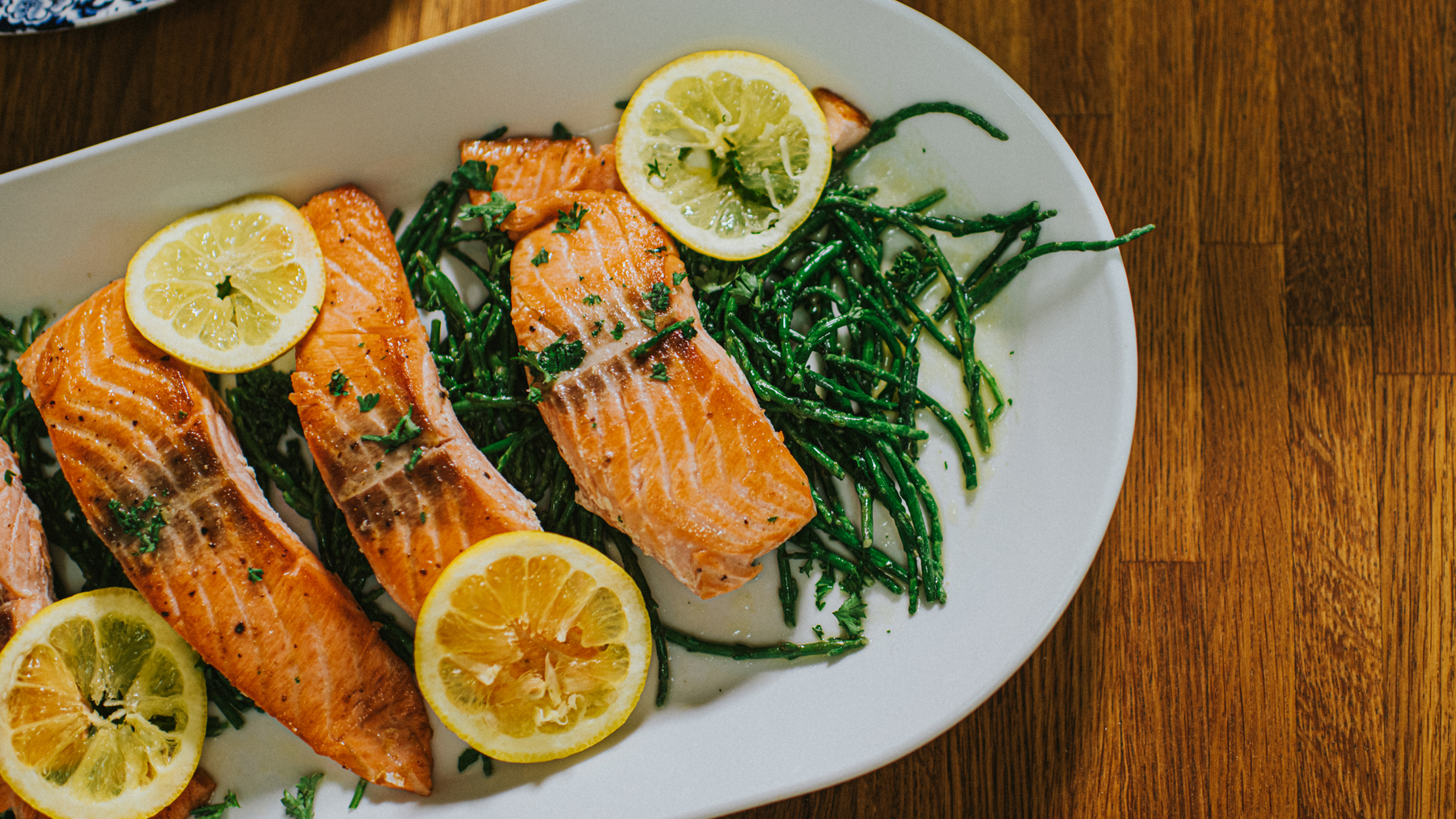
Want to know what to eat to lose belly fat? Belly fat is something that a lot of us have and although it is perfectly natural and human, many people want to do what they can to reduce the amount of fat around their middles. We will look at why the body stores fat around the belly and what to eat to lose belly fat, as well as diving into the different types of dietary fat.
We gain fat around our middle for different reasons, some related to the stage of life, hormonal changes, and general lack of activity or caloric overconsumption. While losing this extra fat may seem impossible, with steady, concerted effort it is possible and may even be an enjoyable process if you choose a way to increase your movement that you find fun. Even better, some of the best exercises for weight loss can be completed at home for free.
How do we gain belly fat?
Dr. Nathalie Geary, body sculpting specialist and founder of the Light Touch Clinic, tells us that stress has a part to play in the accumulation of belly fat. “Fat storage is a survival response to perceived environmental stress,” she says, “When our bodies sense we are in danger, our nervous system acts to mitigate this by accumulating and storing energy as fat. Belly fat in particular surrounds most of our vital organs and was once beneficial in overcoming the stress of periodic famine that humans have endured for most of history. Stress in the modern environment can be any situation that triggers a fight or flight response from the nervous system.
"Though we no longer experience the physical stress of famine, psychological stress instigates the same biological response in our bodies. Fat storage is a hormonal response to stress and is influenced by the hormones Cortisol, Leptin, and Insulin. When these are out of balance in our bodies, they can cause unmitigated weight gain,” notes Geary.
Rob Hobson, a registered nutritionist for British Apples and Pears, tells us why fat accumulates on the belly, often more than in other areas, "The reason fat accumulates in the belly is that it is close to the liver where it can be converted back to energy if needed. Menopause also causes weight to carry around the middle as waistlines thicken.”
Menopause can lead to weight gain due to the rapid change in hormonal makeup and the effect this has on a woman’s body and mind, according to a review in Climacteric journal. Taking one of the best menopause supplements can help to balance out your hormones while going through this change.
While it may feel like doing lots of crunches is going to melt away the fat around your middle, Kim Bowman, a sports nutritionist from F45 Training, explains that overall fat loss is the only way to see a reduction in belly fat, and spot-training doesn’t work.
Start your week with achievable workout ideas, health tips and wellbeing advice in your inbox.
“While core exercises can help to develop abdominal muscular strength and support the lower back, spot training the abdominal region will not make a six-pack appear,” she notes, “For this reason, it’s imperative to focus on full-body fat loss through functional training that combines a variety of bodyweight and plyometric exercises along with HIIT intervals.”
It is important to note that you should enjoy the exercise you are doing, or you are less likely to stick to it. We recommend you look at local groups and fitness classes, as well as focus on increasing your overall movement to help you to lose weight and promote a calorie deficit.

What foods can help reduce belly fat?
Foods that suppress your hunger and give you a sense of satiety are important when it comes to weight loss, and dietary fiber is one of these foods. A study in the Journal of Nutrition indicated that participants who consumed enough fiber found it easier to adhere to their other macronutrient goals over the six-month study. Fiber is another food that can help us feel satisfied, as it has a bulking effect and lingers in the digestive system where it is broken down by our gut bacteria, as our bodies can’t digest it themselves. This means we feel fuller for longer.
Hobson reiterates that targeted fat loss doesn’t work, so you need to work on overall fat loss to see results. “You can’t target fat loss by body area so the same rule applies to anyone else trying to lose weight,” he says. “A diet rich in plant foods that are high in fiber, including fruits such as apples and pears, vegetables, whole grains, and legumes, helps to fill you up and bulk out meals. Protein is also important for satiety so stick to lean proteins such as poultry, tofu or fish. Healthy fats are important to help reduce inflammation in the body as well as keep you feeling full between meals. These fats include avocado, olive oil, oily fish nuts, and seeds.”
Protein is a great way to support healthy weight loss, as it is filling and can help you stay in a calorie deficit, according to a study in the British Journal of Nutrition. As well as being filling, it helps with growth and repair, meaning that you will recover from a tough workout quicker if you are consuming adequate protein than if you don’t consume enough. A high-protein diet has been shown to aid weight loss efforts, so take a look at our guide to the best protein powders for weight loss.
Bowman agrees with the role fats play in healthy weight loss. “Aside from incorporating full-body functional training, quality eating habits can make or break belly-fat loss,” she says. “Lean protein sources and healthy fats such as those from fatty fish like salmon or halibut are quality calories that will optimize our health.”
Do you have to cut out your favorite foods to lose belly fat?
At Fit&Well, we are all about sustainable weight loss. We believe that a gradual approach is more effective and that cutting out all your favorite foods is likely to leave you feeling miserable and unmotivated. As such, we recommend you keep eating your favorite foods, just mindfully and in moderation. All foods can fit within a calorie deficit, and going over your calorie allowance every so often will not undo your progress.
Ruth Stone, a personal trainer for Sweatband explains further: “Studies have found that people that completely remove all indulgence from their diet are actually less likely to lose weight, as this often leads to relapses and binge eating. It is also not psychologically healthy to start viewing food through a prism of ‘good’ and ‘bad’.
“There is no intrinsically bad food, there's simply food that has less nutritional and higher calorific value. Eating a balanced diet, and simply being more aware of what you are eating will enable you to craft a perfect eating plan that will not only help you lose weight but will mean you don’t have to skip on the occasional office cupcake.”
Geary agrees, explaining that extreme calorie-cutting can lead to a yo-yo dieting effect and poor health. “Lowering body fat permanently is a gradual process that is enhanced by proper intake of essential nutrients and metabolizing energy efficiently through exercise,” she says. “Drastic measures to reduce calories without supporting the body with adequate nutrition will likely have long-term negative consequences both physically and mentally."
Instead, she recommends, "Finding healthier alternatives to your favorite foods - not giving them up entirely- seems like a sensible, sustainable approach. Think of a handful of toasted seeds and nuts, lightly seasoned, instead of the usual bag of crisps. Swapping your afternoon biscuit for a small serving of fruit with nut butter can still offer you sweet satisfaction.”
Bowman encourages us to be mindful of our refined sugar intake, as this is likely to topple us over our calorie goals for the day. “Refined sugar often found in store-bought sweets, disrupts blood sugar balance, and can lead to cravings for more of these foods, which provide no nutritional gain (essentially ‘empty calories’),” she says. “By incorporating nutrient-dense, unprocessed foods into our diet on a regular basis instead, we can stay consistent with a healthy eating routine.”

What is the difference between good fats and bad fats?
Fat is one of three macronutrients and is essential for the proper functioning of our bodies. However, according to a study in the International Journal of Molecular Sciences, overconsumption of saturated fats is one of the leading causes of obesity and related conditions in adults.
Bowman tells us more: “Fat is essential for hormone balance, heart health, and brain function as well as vitamin and mineral function,” she says. “Fat plays a key role in our overall long-term health, however understanding the difference between healthy fats versus those that should be avoided is necessary for full-body weight loss."
"The key to quality fat consumption is to avoid processed fats known as trans fats as much as possible. These fats are found in processed foods such as chips, pre-packaged dinners, and store-bought salad dressings, and have undergone significant processing.
"The problem is that these trans fats don’t provide nutritional benefits while at the same time contributing to inflammation within the body. Instead, the majority of fat intake should come from minimally processed, plant-based (unsaturated fat) sources while also incorporating fatty fish such as salmon, tuna, and halibut.”
While we should ensure that trans and saturated fats are consumed at a minimum, polyunsaturates, such as omega 3 (which can be sourced via one of the best fish oil supplements) and omega 6 are very important for our health. A study in Biomedicine & Pharmacotherapy indicates that we need to consume these polyunsaturated fatty acids together in balance, as high levels of Omega-6 can contribute to the development or worsening of inflammatory diseases, cardiovascular problems, and cancer.
Discover more articles on looking after your insides better such as finding out what is the most common vitamin deficiency and the answer to does drinking water help you lose weight?

Lou Mudge is a Health Writer at Future Plc, working across Fit&Well and Coach. She previously worked for Live Science, and regularly writes for Space.com and Pet's Radar. Based in Bath, UK, she has a passion for food, nutrition and health and is eager to demystify diet culture in order to make health and fitness accessible to everybody.
Multiple diagnoses in her early twenties sparked an interest in the gut-brain axis and the impact that diet and exercise can have on both physical and mental health. She was put on the FODMAP elimination diet during this time and learned to adapt recipes to fit these parameters, while retaining core flavors and textures, and now enjoys cooking for gut health.
